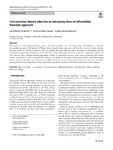Mostrar o rexistro simple do ítem
Low-Precision Feature Selection on Microarray Data: An Information Theoretic Approach
| dc.contributor.author | Morán-Fernández, Laura | |
| dc.contributor.author | Bolón-Canedo, Verónica | |
| dc.contributor.author | Alonso-Betanzos, Amparo | |
| dc.date.accessioned | 2022-06-08T15:40:39Z | |
| dc.date.available | 2022-06-08T15:40:39Z | |
| dc.date.issued | 2022 | |
| dc.identifier.citation | Morán-Fernández, L., Bolón-Canedo, V. & Alonso-Betanzos, A. Low-precision feature selection on microarray data: an information theoretic approach. Med Biol Eng Comput 60, 1333–1345 (2022). https://doi.org/10.1007/s11517-022-02508-0 | es_ES |
| dc.identifier.uri | http://hdl.handle.net/2183/30856 | |
| dc.description | Financiado para publicación en acceso aberto: Universidade da Coruña/CISUG | |
| dc.description.abstract | [Abstract] The number of interconnected devices, such as personal wearables, cars, and smart-homes, surrounding us every day has recently increased. The Internet of Things devices monitor many processes, and have the capacity of using machine learning models for pattern recognition, and even making decisions, with the added advantage of diminishing network congestion by allowing computations near to the data sources. The main restriction is the low computation capacity of these devices. Thus, machine learning algorithms capable of maintaining accuracy while using mechanisms that exploit certain characteristics, such as low-precision versions, are needed. In this paper, low-precision mutual information-based feature selection algorithms are employed over DNA microarray datasets, showing that 16-bit and some times even 8-bit representations of these algorithms can be used without significant variations in the final classification results achieved. | es_ES |
| dc.description.sponsorship | This work has been supported by the grant Machine Learning on the Edge - Ayudas Fundación BBVA a Equipos de Investigación Científica 2019. It has also been possible thanks to the support received by the National Plan for Scientific and Technical Research and Innovation of the Spanish Government (Grant PID2019-109238GB-C2), and by the Xunta de Galicia (Grant ED431C 2018/34) with the European Union ERDF funds. CITIC, as Research Center accredited by Galician University System, is funded by “Consellería de Cultura, Educación e Universidades from Xunta de Galicia”, supported in an 80% through ERDF Funds, ERDF Operational Programme Galicia 2014-2020, and the remaining 20% by “Secretaría Xeral de Universidades” (Grant ED431G 2019/01). Open Access funding provided thanks to the CRUE-CSIC agreement with Springer Nature | es_ES |
| dc.description.sponsorship | Xunta de Galicia; ED431C 2018/34 | es_ES |
| dc.description.sponsorship | Xunta de Galicia; ED431G 2019/01 | es_ES |
| dc.language.iso | eng | es_ES |
| dc.publisher | Springer | es_ES |
| dc.relation | info:eu-repo/grantAgreement/AEI/Plan Estatal de Investigación Científica y Técnica y de Innovación 2017-2020/PID2019-109238GB-C22/ES/APRENDIZAJE AUTOMATICO ESCALABLE Y EXPLICABLE/ | |
| dc.relation.uri | https://doi.org/10.1007/s11517-022-02508-0 | es_ES |
| dc.rights | Atribución 4.0 internacional | es_ES |
| dc.rights.uri | http://creativecommons.org/licenses/by/4.0/ | * |
| dc.subject | Microarray data | es_ES |
| dc.subject | Low precision | es_ES |
| dc.subject | Feature selection | es_ES |
| dc.subject | Mutual information | es_ES |
| dc.subject | Classification | es_ES |
| dc.subject | Edge computing | es_ES |
| dc.subject | Internet of Things | es_ES |
| dc.title | Low-Precision Feature Selection on Microarray Data: An Information Theoretic Approach | es_ES |
| dc.type | info:eu-repo/semantics/article | es_ES |
| dc.rights.access | info:eu-repo/semantics/openAccess | es_ES |
| UDC.journalTitle | Medical and Biological Engineering and Computing | es_ES |
| UDC.volume | 60 | es_ES |
| UDC.startPage | 1333 | es_ES |
| UDC.endPage | 1345 | es_ES |
| dc.identifier.doi | 10.1007/s11517-022-02508-0 |
Ficheiros no ítem
Este ítem aparece na(s) seguinte(s) colección(s)
-
GI-LIDIA - Artigos [61]






